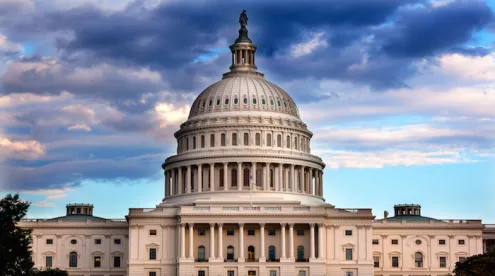Members of Congress continue their scheduled recess this week, conducting work largely outside of Washington, D.C. and back in their home districts. Both chambers are scheduled to return on Monday, April 13 with a loaded spring agenda.
Thursday’s announcement of a framework agreement reached between six world leaders and Iran to curtail the Iranian nuclear program was met with mixed congressional reaction and will likely be a topic of debate when members return to Washington next week. Even prior to the announcement of a framework agreement, Democratic and Republican members alike have been eager to play a legislative role in any deal. Congressional Republicans have been critical of the international negotiations that have taken place over the last few months, as evidenced by the letter sent by 47 Republican Senators to the Iranian regime warning that Congress would have the final say over any deal worked out at the negotiating table. The Senate Foreign Relations Committee has scheduled a markup on April 14 of the Iran Nuclear Review Act, bipartisan legislation that would require the president to submit any Iran nuclear agreement to Congress within five days of its conclusion. Senator Bob Corker, Chairman of the Foreign Relations Committee and lead sponsor of the bill, will have to work to retain Democratic support in the Senate because President Obama has issued a veto threat. Further complicating the prospects for the Iran Nuclear Review Act is the fact that Democratic leadership on the Foreign Relations Committee is shifting. The bill’s lead Democratic sponsor, Senator Robert Menendez (D-NJ), has stepped down as the Ranking Member of the Committee in the wake of a federal indictment on corruption charges. The Committee’s new Ranking Member, Senator Ben Cardin (D-MD), has been cautious of taking a position yet on the bill or the framework agreement, though he has stated publicly that he believes it “appropriate for Congress to be able to review an agreement.” Senate Republican leadership is aiming for a strong bipartisan vote in favor of the bill, hoping to demonstrate the ability to override any veto. Given the nature of the underlying issues, the stakes are unusually high, and we can expect the intensity of the expected debate to reflect those stakes.
Another potential item when Congress returns is the consideration of the President’s request for authorization for the use of military force against the Islamic State, a request that has been the subject of some hearings but no action on the Hill. Members may also consider a highway and infrastructure funding bill because the current authorization expires at the end of May and Transportation Secretary Foxx announced this week that federal highway funding will run out during the summer, which is, of course, the height of the road building and rebuilding season. Key House committee chairmen are looking for a short-term funding fix, and an extension of the program is likely, but a long-term solution appears elusive. Also on tap: the charter for the federal Export-Import Bank is set to sunset in June unless renewed by affirmative congressional action, and the USA PATRIOT Act will also lapse at the start of June unless renewed. Expect controversy over both issues. The Senate remains mired in a tussle over trafficking-in-persons legislation, and once it resolves that, it is likely to take up the nomination of Loretta Lynch to be Attorney General. Last week, Ms. Lynch secured sufficient Republican votes to ensure her confirmation when Sen. Mark Kirk (R-IL) became the fifth Republican senator to announce his support for her; the timing of the consideration of her nomination, however, remains up in the air.
When they return after the Easter-Passover recess, the first order of business is likely to be the reconciliation of differences between House- and Senate-passed Fiscal Year 2016 budget resolutions. While both chambers have passed largely similar proposals, differences exists between both chambers over how deeply to cut domestic spending. In addition, Republican defense and deficit hawks continue to disagree over how much money to provide the Department of Defense. The 2011 budget agreement and deficit reduction sequester established spending caps on defense funding, which many Republican defense hawks argue do not provide adequate defense spending, especially given the current perilous global security situation. Fiscal conservatives argue that any increase in spending for DOD should be offset. The military funding issue and the scope of domestic funding cuts are expected to consume much of the debate as House and Senate conference committee members work out a path towards a joint budget resolution, which must be enacted by both chambers in order to permit them to take up a reconciliation bill. A reconciliation bill can carry lots of unrelated provisions, but lurking in the background is the proposed repeal of the Affordable Care Act (Obamacare) in both chambers’ budgets, a provision that will prompt a veto of any likely reconciliation bill.




 />i
/>i


